I was trying to match IPv4 addresses using regex. I got following regex.
But I am not able to understand ?: in it.
## r'(?:(?:25[0-5]|2[0-4][0-9]|[01]?[0-9][0-9]?)\.){3}(?:25[0-5]|2[0-4][0-9]|[01]?[0-9][0-9]?)'
>>> import re
>>> re.findall(r'(?:(?:25[0-5]|2[0-4][0-9]|[01]?[0-9][0-9]?)\.){3}(?:25[0-5]|2[0-4][0-9]|[01]?[0-9][0-9]?)', txt)
['254.123.11.13', '254.123.11.14', '254.123.12.13', '254.123.12.14', '254.124.11.13', '254.124.11.14', '254.124.12.13']
I know ?: is for avoiding capturing of a group, but here I am not able to make a sense with it.
Update:
If I am removing ?:, I am getting following result. I thought I will get IP address along with captured groups in tuples.
>>> re.findall(r'((25[0-5]|2[0-4][0-9]|[01]?[0-9][0-9]?)\.){3}(25[0-5]|2[0-4][0-9]|[01]?[0-9][0-9]?)', txt)
[('11.', '11', '13'), ('11.', '11', '14'), ('12.', '12', '13'), ('12.', '12', '14'), ('11.', '11', '13'), ('11.', '11', '14'), ('12.', '12', '13')]

